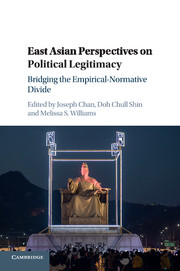Book contents
- Frontmatter
- Contents
- List of Contributors
- Preface and Acknowledgments
- 1 Political Legitimacy in East Asia: Bridging Normative and Empirical Analysis
- 2 Reasons to Obey: “Multiple Modernities” and Constructions of Political Legitimacy
- 3 Do East Asian States Enjoy a Legitimacy Premium?
- 4 Political Legitimacy in China: A Confucian Approach
- 5 Political Legitimacy in Hong Kong: A Hybrid Notion
- 6 The Evolution of Political Legitimacy in Singapore: Electoral Institutions, Governmental Performance, Moral Authority, and Meritocracy
- 7 Polarized Politics, Government Legitimacy, and Democratic Legitimacy in Taiwan
- 8 The Legitimacy of Democratic Rule in Korea: From the Perspective of the Mass Citizenry
- 9 Political Legitimacy, Satisfaction, and Japanese Democracy
- 10 Legitimacy as a Hybrid Phenomenon
- Index
10 - Legitimacy as a Hybrid Phenomenon
Published online by Cambridge University Press: 30 December 2016
- Frontmatter
- Contents
- List of Contributors
- Preface and Acknowledgments
- 1 Political Legitimacy in East Asia: Bridging Normative and Empirical Analysis
- 2 Reasons to Obey: “Multiple Modernities” and Constructions of Political Legitimacy
- 3 Do East Asian States Enjoy a Legitimacy Premium?
- 4 Political Legitimacy in China: A Confucian Approach
- 5 Political Legitimacy in Hong Kong: A Hybrid Notion
- 6 The Evolution of Political Legitimacy in Singapore: Electoral Institutions, Governmental Performance, Moral Authority, and Meritocracy
- 7 Polarized Politics, Government Legitimacy, and Democratic Legitimacy in Taiwan
- 8 The Legitimacy of Democratic Rule in Korea: From the Perspective of the Mass Citizenry
- 9 Political Legitimacy, Satisfaction, and Japanese Democracy
- 10 Legitimacy as a Hybrid Phenomenon
- Index
Summary
INTRODUCTION
The chapters in this volume have explored the idea of legitimacy in East Asia from various angles, often emphasizing the historical exchanges between nations within the region as well as the voluntary and involuntary encounters of East Asia with European and American powers. One salient feature of these studies is the sheer diversity and complexity of the cultural phenomenon they each call “legitimacy.” Legitimacy appears variously as a philosophical justification for rule (Williams, Chapter 2), a set of subjective judgments or citizen attitudes (Shin and Cho, Chapter 8), or a recognition by citizens of the morality of the regime that rules them (Bell, Chapter 4). Its character is described as exhibiting “traditional” East Asian features (Bell, Chapter 4), stemming from what Gilley identifies as “a pervasive political culture” of the region (Gilley, Chapter 3, p. 56) – even as it remains bound up with fundamental questions of modernity, including phenomena such as bureaucratization and rationalization that may have universal valence (Williams, Chapter 2, and Tan and Wong, Chapter 6). Lam (Chapter 5) suggests that legitimacy in Hong Kong may even span all of these categories. Huang (Chapter 7) argues that a much less broad set of these elements is key to the “battle of political legitimacy” ongoing in emerging democratic polities such as Taiwan (Huang, Chapter 7, p. 168). Not surprisingly, given the complexity of this phenomenon, some of the chapters exhort us to diversify and complicate our understanding of legitimacy, seeing it as a combination of many different conative components, evaluative judgments, and attitudinal states (Bell, Chapter 4; Shin and Cho, Chapter 8; and Lam, Chapter 5).
In this concluding chapter, I suggest the concept of hybridity to render legible the kinds of diversity we see in these chapters. Hybridity is not simply a mixture or juxtaposition of different elements. Rather, the concept portrays social realities as always constituted (as opposed to, say, merely episodically enhanced) by multiple elements – regime types, allegiances, values, cultures, interests, motives – whose relative content and relationship change dynamically over time, both producing and being produced by the conditions in which they are found. My exploration of hybridity is not meant to determine exclusively how legitimacy in East Asia should be understood.
- Type
- Chapter
- Information
- East Asian Perspectives on Political LegitimacyBridging the Empirical-Normative Divide, pp. 238 - 256Publisher: Cambridge University PressPrint publication year: 2016
- 2
- Cited by



